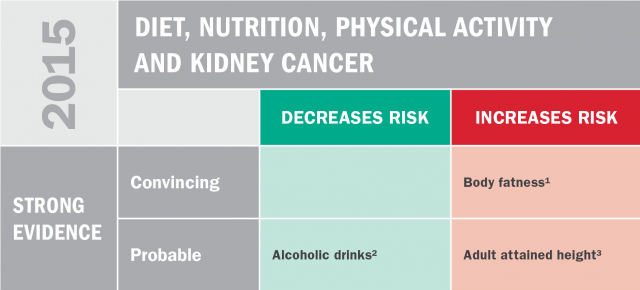The majority of kidney cancers are renal cell carcinomas when cancer cells are found in the lining of small tubes in the kidney. Men are almost twice as likely as women to be diagnosed with kidney cancer.
The kidneys are a pair of organs located at the back of the abdomen on either side of the spine. They filter waste products and water from the blood, producing urine.
AICR’S latest report on kidney cancer found that maintaining a healthy weight can lower your risk. Consuming a moderate amount of alcohol may offer some protection against kidney cancer.
Lifestyle and kidney cancer risk.
- Weight
There is strong evidence that being overweight or obese increases the risk of kidney cancer.
- Being overweight and obese increases blood levels of insulin and related hormones that can encourage the growth of cancer.
- Excess fat also creates a pro-inflammatory environment in the body that can contribute to the growth of cancer.
- Alcohol
There is strong evidence that consuming alcoholic drinks decreases the risk of kidney cancer
- This is based on evidence for alcohol intakes up to 30 grams per day (about two drinks a day).
- The mechanisms that may explain the inverse relationship between moderate alcohol consumption and kidney cancer risk are uncertain.
- Possible biological mechanisms proposed include improved blood lipid profiles among people who drink a moderate amount of alcohol and higher adiponectin levels.
- There is insufficient evidence how higher amounts of drinking — such as 3 drinks or more per day — may link to kidney cancer. It is also important to remember that strong evidence shows alcohol increases the risk of several other cancers.
- Smoking
Smoking is a cause of kidney cancer.
- Both current and former smokers have an increased risk of renal cell cancer compared to people who have never smoked.
- Other Factors
- Adult-attained height: There is probable evidence that developmental factors leading to greater height may increase risk.
- Medications: Painkillers containing phenacetin are known to cause cancer of the renal pelvis. Phenacetin is no longer used as an ingredient in painkillers.
- Kidney disease: Polycystic kidney disease predisposes people to kidney cancer.
- Hypertension: High blood pressure is associated with a higher risk of kidney cancer.

Foods that fight cancer.
No single food can protect you against cancer by itself. But research shows that a diet filled with a variety of vegetables, fruits, whole grains, beans and other plant foods helps lower risk for many cancers.
Cancer Updates
The science of survival.
AICR’s health guides and recommendations are developed from research that focuses on how nutrition and lifestyle affect the prevention, treatment, and survival of cancer. Paramount to our updates is the Continuous Update Project which helps you stay on top of new findings, and understand the data that sits at the center of our work.






